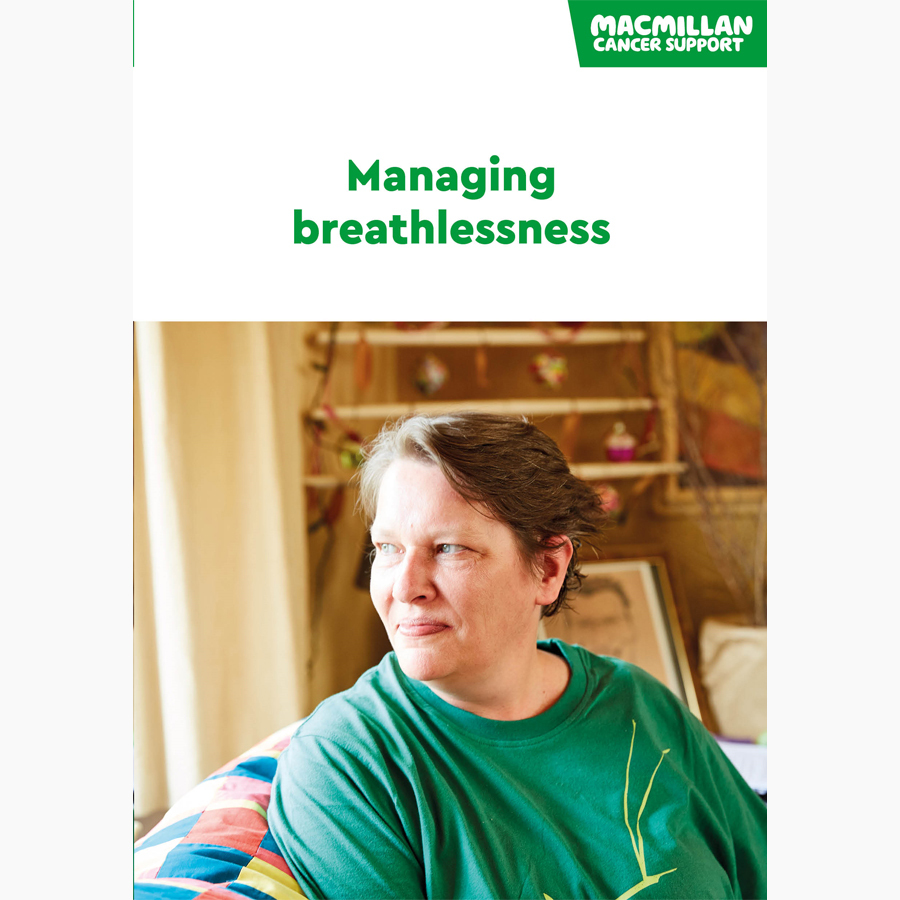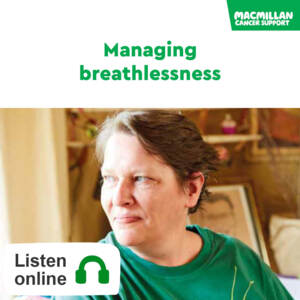Managing and treating breathlessness
If you have breathlessness, there are ways to manage it and treatments that may help.
What can I do to manage breathlessness?
There are some things you can do that may improve breathlessness, or help you cope with it. The following tips may be especially helpful if you have long term (chronic) breathlessness.
Changing how you breathe
When you are breathless, you may try to take big breaths into the lungs. You may breathe faster and have tension in your upper chest and shoulders. Breathing in this way can make you more tired. This makes breathing uncomfortable and you can feel even more out of breath.
To break this cycle, try to focus on breathing out and relaxing the upper chest and shoulders. Learning breathing techniques such as relaxed tummy breathing (breathing control), explained below, can help.
Physical activity
Breathlessness can be uncomfortable. You may want to avoid moving around so that your breathlessness does not get any worse. Family or friends may help you more which causes you to move around even less.
But physical activity can improve your breathing. It helps you be as fit as possible and can make you feel better. Even people with severe breathing problems can benefit from small amounts of physical activity.
Physical activity may not make you more breathless, especially if you go slowly and use relaxed tummy breathing as much as possible.
By slowly doing more activity you will become fitter, and your muscles will become stronger. Over time, you will be more confident in your ability to calm your breathing. You will also know when and how to do this. It can help to remember that breathlessness usually goes away in a few minutes.
If your breathlessness starts to get worse or gets worse quickly, make sure you see a doctor straight away. There may be a new cause for your breathlessness that needs treatment quickly.
Booklets and resources
Breathing techniques
Breathlessness can be hard to live with, but there are ways you can reduce how much it affects your life. Learning some breathing techniques can help.
It helps to practise these breathing techniques for the first time when you are not too breathless, if possible. Then you will find them easier to do when you are feeling breathless. Knowing there are things you can do when you feel breathless can help you feel more in control. It might help for someone to read the instructions to you the first time.
Try to remember to do these breathing techniques as often as possible. It can take some time to get used to them. Try not to force the exercises or expect instant results. Aim for a slow change from breathlessness to calmer breathing.
To start, it might help to ask your specialist nurse or GP if you can see a physiotherapist or occupational therapist. They can help you learn these techniques.
Get into a comfortable position
When you feel breathless, get into a comfortable position that supports your upper chest muscles and allows your diaphragm and tummy to expand fully.
Below are some comfortable positions that can help with breathlessness. Try different positions and find one that works best for you.
Position 1
- Sit in a chair in an upright position, with your back supported.
- Keep your legs uncrossed and your feet on the floor.
- Let your shoulders drop and feel heavy, with your arms resting softly in your lap, or on the arms of the chair.
- Keep your head up or relax it back against the chair if you are sitting in a high-backed armchair.
Position 2
- Sit in a chair and lean forward from your hips.
- Rest your elbows and lower arms on your thighs, supporting your upper body.
- Have your legs uncrossed, your feet on the floor and your shoulders relaxed.
- Keep your knees shoulder-width apart and let your chest relax when you lean forward.
Position 3
- Stand and lean forward on to a secure surface.
- Let your arms and elbows rest on the surface, so you are supporting the weight of your upper body.
- Keep your shoulders and chest relaxed by keeping your arms shoulder-width apart.
Position 4
- Stand up and lean back against a surface that supports your weight, such as a wall.
- Let your arms drop to your sides and let your shoulders feel heavy and relaxed.
Relaxed tummy breathing (controlled breathing)
An important part of managing breathlessness is learning relaxed tummy breathing. This is sometimes called controlled breathing. This uses your diaphragm and lower chest muscles to help you breathe more efficiently. Breathing from the lower chest and tummy can also help you relax.
If you practise this when you are not too breathless, you will find it easier to do when you are breathless.
- Sit comfortably, with your neck, shoulders and back well supported.
- Relax your shoulders and upper chest.
- If possible, breathe in gently through your nose. When you inhale, your tummy area and lower chest should expand. Your upper chest should stay relaxed.
- If possible, breathe out slowly through your nose. Watch your tummy sink back down. Relax your shoulders and upper chest a little more each time you breath out.
- Pause slightly as you breathe out before the next breath begins.
- Continue doing steps 1 to 5 until your breathing is calmer.
Practise relaxed tummy breathing in the following ways:
- when you first wake up
- when you go to sleep
- throughout the day when you are resting.
To check you are breathing from the lower chest, put 1 hand on your tummy, just below your ribcage. As you breathe in, you should feel your hand rising. As you breathe out, your hand will sink back down. Your upper chest and shoulders should not move.
It may help to sit sideways next to a mirror. This is so you can see your lower chest moving in and out.
If you feel too breathless, try breathing in through your nose and out through your mouth. You may have to mouth-breathe until your breathing settles enough to return to nose breathing.
If you are in bed
- Try to sit up with your head and back supported by pillows. This allows you to expand and open your chest area.
- Let your head rest back gently on the pillow, so you can feel the tension leave your neck and shoulders.
- Rest your arms by your sides. You can support them with pillows if this is more comfortable.
- Some people find their breathing feels more comfortable if they lie on their side instead of their back.
Pursed lip breathing
Some people find it helpful to use pursed lip breathing to help ease breathlessness during or after an activity, such as walking. This technique involves breathing in through the nose and then out through pursed lips, as if blowing out a candle. Some people may find it easier to breathe in through their mouth instead and then out through pursed lips.
Using a handheld fan
Studies have shown that cooling the face with a handheld fan is a simple way of easing breathlessness. Many people usually notice a difference within a few minutes.
Carry a handheld fan with you to use whenever you need it. Or you can keep one by your bed to use at night. These fans are small and light, and easily fit into a handbag or pocket. A floor-standing fan or desktop fan can also be helpful.
The following tips for using a fan may help:
- Get into a comfortable position.
- Hold the fan about 15cm (6in) away from your face.
- Let the cool air blow towards the nose and mouth. Move it side to side so your cheeks are cooled.
- Sitting in front of an open window with the cool air blowing over your face can also be helpful. Some people find putting a cool flannel on their face before using the fan increases the cooling effect.
You can watch a video on how to use a handheld fan from the Cambridge Breathlessness Intervention Service.
Relaxation
Learning and practising relaxation techniques can help you control anxiety and breathe more easily. We have described 1 technique you might like to try below.
It can take practice to become good at it. Try it for 5 to 10 minutes once a day to start with. Then you can try to do it for longer. Set aside time during the day to practise. It might help to ask someone to read these instructions to you.
Relaxation technique
Make yourself comfortable. You can do this sitting or lying down. Make sure your shoulders, back and neck are well supported. You may want to try using a high-backed chair. Have your arms by your sides or rest your hands on your lap.
- Close your eyes.
- Start by breathing out and then in, only as much as you need. Then breathe out slowly with a slight sigh.
- Do this again, as slowly as you can. As you breathe out, feel any tension in your body start to drain away. Then let your breathing go at an even, steady pace.
- When you feel comfortable doing this, you can move on to the next stage.
- Start to think about each part of your body, 1 at a time.
- Start with your toes. Wiggle them, then let them relax. Let them feel heavy, and free of any tension.
- Now think about your legs. Let your thighs relax and roll outwards.
- Next, let your tummy muscles become soft and relaxed.
- Make a fist with your hands, then let go. Let your fingers become limp and still. Let this relaxed feeling spread up your arms to your shoulders.
- Let your shoulders relax and drop easily.
- Let your neck muscles relax. Your head is resting and supported. Enjoy this relaxed feeling.
- Let your face and expression relax. Let your jaw rest in a relaxed position.
- As your body feels relaxed, be aware of the all-over feeling of letting go. If you find your mind becoming busy again, think about where your muscles have tensed and then relax them.
- Slowly bring your attention back to the room. Have a gentle stretch and open your eyes. Remember to get up slowly when you have finished. If you managed to fully relax, your blood pressure may have dropped. You may feel dizzy if you get up suddenly. Bending and stretching your arms and legs a few times before standing up should help.
When you feel comfortable doing the relaxation exercise, it can help to listen to some relaxing music while you do it.
You can listen to a recording of these instructions.
What can I do to manage breathlessness?
There are different medicines and treatments that may help with breathlessness. You can talk to your GP, cancer doctor or specialist nurse at the hospital.
-
Painkillers
Some types of painkillers can help relieve breathlessness. For example, morphine can be taken as a tablet, in liquid form, or by injection under the skin.
-
Sedative drugs
Sedatives can help relieve anxiety. It is always better to try to learn some relaxation exercises to help with breathlessness, before trying sedatives.
-
Steroids
Steroids can help reduce inflammation in the airways of the lungs. This may help to reduce breathlessness.
-
Bronchodilator drugs
These widen the air passages and increase airflow. You usually have them through an inhaler. If you find it hard to use an inhaler, your GP or practice nurse may give you a spacer device. This is a tube that fits onto your inhaler mouthpiece. It helps make sure the drug from the inhaler reaches the lungs.
Bronchodilator drugs can sometimes be given as tablets. Or they can be given as a liquid through a small machine called a nebuliser.
-
Sterile salt water (saline)
This can be given through a nebuliser to loosen sticky phlegm (mucus).
-
Diuretics
Diuretics are medicines to help you pass more urine (pee). They can help if your breathlessness is caused by having too much fluid in or around the lungs. These drugs help you get rid of excess fluid. You may have them as tablets, or sometimes as a drip (infusion).
Oxygen treatment
Oxygen is used to help with low oxygen levels, not to treat breathlessness. So oxygen is only suitable for people who are breathless because of low oxygen levels in the blood.
If your oxygen levels are not low, other ways to manage breathlessness may work better. Your doctor or nurse can tell you more about this. Using a fan or sitting by an open window may give the same benefit. Your doctor may give you oxygen if you have tried other ways to help with breathlessness but still feel breathless.
If you only need oxygen for short periods, your doctor may recommend oxygen that is stored in a cylinder. If you need oxygen for longer periods, they may suggest a machine that filters oxygen from the air around you (oxygen concentrator). You breathe in the oxygen through a face mask or small tubes that sit under the nostrils (nasal cannula).
If you want to go out, you can get a portable cylinder. If you use a wheelchair, you can have it fitted to this. If you want to travel with oxygen, there are a few things to consider. You can find out more from the British Lung Foundation or the NHS.
If you smoke, you need to tell the doctor prescribing the oxygen. Smoking is not allowed in a house where there is home oxygen. This is because of a serious risk of explosion and fire.
About our information
This information has been written, revised and edited by Macmillan Cancer Support’s Cancer Information Development team. It has been reviewed by expert medical and health professionals and people living with cancer.
-
References
Date reviewed

Our cancer information meets the PIF TICK quality mark.
This means it is easy to use, up-to-date and based on the latest evidence. Learn more about how we produce our information.







